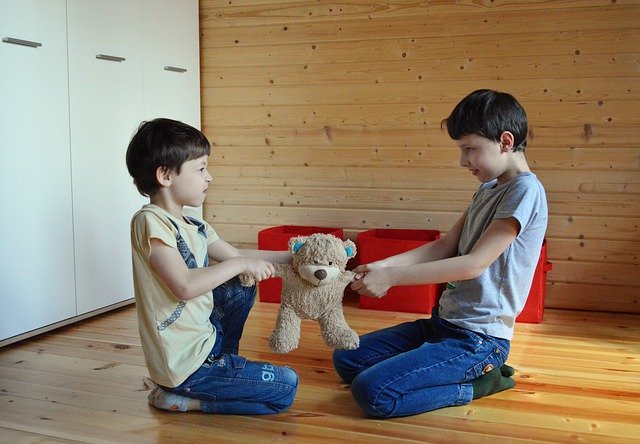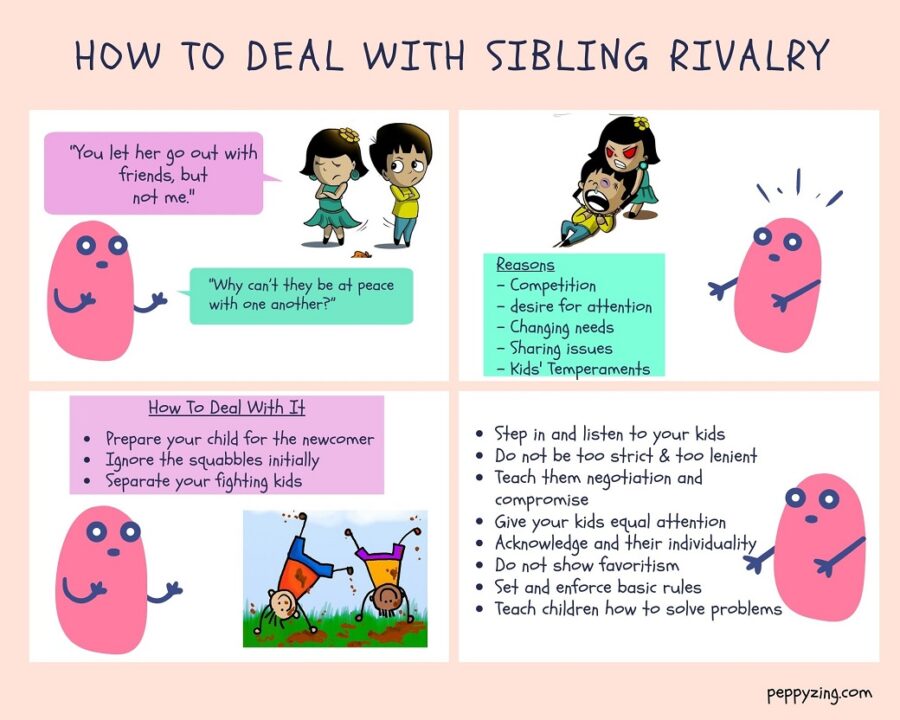
“You let her go out with friends, but not me”.
“You always favor him”
“I wish I were the only child in this home.”
These are some common statements; you might have often come across, which indicate sibling rivalry, if you are a parent of two or more kids.
Sibling rivalry is almost inevitable as long as you have more than one child in your home. It’s a concern for most of the parents, as siblings, fighting, jealousy, and competition leaves them overwhelmed, frustrated, exhausted, and worn out.
“Why can’t they be at peace with one another?”
Let’s face it – although siblings can be the closest of friends, it is difficult to find them, get along perfectly with one another. Sibling rivalry is common and bound to occur at one point in time. Though, it can be frustrating and disappointing to watch your kids fight with one another.
What Is Sibling Rivalry
Sibling rivalry is the competition, jealousy, and fight between the brother and sister, between the sisters or brothers. The competition is heightened if you have twins.
Sibling rivalry is more common among children who are the same gender and have less age gap between them.
The problem usually starts with the birth of the second child and continues throughout childhood, competing for toys to almost everything possible.
What Causes Sibling Rivalry
For most of you, watching your children fighting and competing for every other thing, might be getting on your nerves. This can be maddening, as you don’t like your children to be unpleasant to one another and hurt each other. There can be many factors contributing to it.
Let’s Understand What Causes Sibling Rivalry.

1. Competition For Defining Their Individuality
Each child shows, they are different from their siblings. They discover their talents and, interests which set them apart from their siblings. They compete in defining who they are as an individual.
My close friend, a mother of two toddlers, says that her younger one always competes with the older one to outperform him. Be it eating, playing, studying, or any other activity, he has a strong desire to prove himself to be better than his brother in every aspect. Unable to do so, makes him angry and ends up picking up a fight with his elder brother.
2. Desire For Attention
My sister called up the other day and was saying that, ever since she has delivered her second baby, her son has started behaving erratic and has been constantly throwing tantrums to divert her attention towards him.
If you try to view it from her son’s perspective, he, the only child previously, was the sole focus of his mother’s attention. With the arrival of her sister, he feels that he is not getting an equal amount of attention and response, as much as her sister is getting from his parents.
While his mother is most of the time, busy feeding and taking care of her sister, his father is busy running errands of the household before they can play together. Consequently, her son has developed jealousy and started showing aggression towards his sister.
3. Changing Needs
Changing needs of the kids affect how they relate to one another. For instance, it is natural for toddlers to be protective of their toys and belongings. So, when the baby brother, or sister, takes the toddler’s toys, the older one may snatch it and react aggressively.
Similarly, when kids start attending school, they develop a strong sense of fairness and equality. Consequently, they might not understand why they are being treated differently and why their sibling gets preferential treatment.
Teenagers, however, might resent cooperating, or undertake household responsibilities, as they are in a process to develop their sense of independence and individuality.
These differences, during the different stages of development, can influence the relationship with their siblings.
4. Sharing Issues

Many households do not have unlimited resources. You might be operating on a tight budget and it might require the siblings to share their toys and other possessions.
Giving up on their favorite toy or sharing it with their siblings can be painful for the young children, and may ignite sibling rivalry between them.
5. Transitional Changes
Sibling rivalry usually aggravates when there is a change in your family like the arrival of a new baby, sibling starts attending school when they grow up into teenagers, and so on.
Similarly, sibling rivalry often intensifies when they leave their house for higher education for better career prospects.
6. Kids’ Temperaments
Kids vary in their temperament and personality. Some children find it difficult to manage their anger and can result in triggering a reaction in another sibling.
Your older child might be temperamentally headstrong and more challenging, while the younger one might temperamentally be quieter and calm. Such temperament of the older one may easily annoy the younger one, leading to fights between them.
Differences in temperament, age, and gender, between the siblings, can lead to sibling rivalry. Also, how parents react to their children, can increase the intensity of competition between them.
7. Change In The Family Circumstances
Children, although raised in the same environment in the household, change, or differences in the circumstances can alter their experiences.
This Can Be Due To Any Of The Following Reasons:
- Finances of the family at any given time.
- Whether both the parents worked.
- Who looked after the children, when the parents worked.
- The place where the family lived.
- Their parents’ relationship, while the children were growing up.
All these can impact the child’s relationship with their siblings.
The stressed environment at home, the regular fight between the parents, divorce, or remarriage can also influence the way siblings see one another.
8. Parenting Style
The parenting approach which you opt can have an impact on how the children get along with their siblings.
Parenting approaches range from being too strict and aggressive to too permissive and lenient. Children raised in families at either end of this continuum tend to develop a sibling rivalry and fight more.
When you are rigid, overly harsh, and discipline your children through corporal punishment, the children tend to fight more with siblings as they learn it from the behavior you modeled for them.
Similarly, if you are permissive or lenient and don’t have rules to guide your children’s behavior, they tend to be reckless and fight more.
Is Sibling Rivalry Normal

Sibling rivalry is not a disorder, rather, fighting and arguing between siblings is normal. It’s okay to have words and actions between them and to hold strong feelings for one another.
This is how your children learn to sort out their problems and develop strategies they can use in other situations. Sibling rivalry is a part of how children establish their place in the family.
Fighting between your children will decrease as they grow older and learn more, tolerance, and social skills.
While some siblings may develop understanding and get along well, over the years, some may take many years and yet not come to terms with one another. Different personalities and temperaments may never let them like each other or get along well.
The Effects Of Sibling Rivalry
Studies believe that sibling rivalry is often filled with psychological and physical aggression.
- This can traumatize children, leading to higher instances of anger, depression, and anxiety later in life.
- Initially, you may consider it to be okay for your kids to fight things out, but siblings’ hostile and abusive behavior can persist even into adulthood, causing emotional issues for a lifetime.
- It could even impact a child’s self-esteem and sense of self-identity.
If you find your kids fighting physically or humiliating each other, you must intervene and teach them how to resolve their conflicts without being hostile and abusive.
How To Deal With The Sibling Rivalry
While it may be common for kids to fight, dealing with sibling rivalry and resolving their conflicts can be challenging and exhausting for parents.
1. Prepare Your Child For The Newcomer

The arrival of a new sibling can initiate strong feelings of insecurity and jealousy in the older child. Your attention which used to be completely theirs is now shared with another. This sudden shift of your attention from them to the new-born may make them resentful towards their siblings.
To help your child cope up with the change and make this progression smooth for them –
- Let your child know about the expected baby in advance. This will help your toddler to be prepared for a sibling.
- Make arrangements for the baby ahead of time, so that your older child is used to the changes when the baby arrives.
- If your child still shares your bed, arrange a separate cot for them as soon as possible. If you wait until the baby arrives, your kid may resent the new baby for stealing their place.
- Involve your child in the discussion related to the baby like deciding a name for the baby, or how the baby will need help, and so on.
- Engage your toddler in the activities outside the house. If your child is above 2 years, consider sending them to the playgroup.
2. Ignore The Squabbles Initially
The fight between your kids might be driving you nuts, but do not intervene unless there is a risk of getting hurt physically. If you get involved, your kids may start expecting you to come to their rescue as and when they indulge in a fight.
This may not help them learn to resolve their problems on their own.
Besides, it may seem to one of your children that the other one is always being ‘protected’, which can foster even more animosity.
On the flip side, the other kid may feel that they can easily get away with more, as you would always come forward to ‘rescue’ them.
3. Separate Your Fighting Kids
If you notice, your kids are getting verbally or physically aggressive, intervene, immediately.
- Separate your fighting kids first and let them stay in two different corners.
- Making them stay away, for some time, from one another, will help them cool down on their own.
- Sometimes, children need some space and time, to get things sorted.
4. Step In And Listen To Your Kids
Encourage your children to resolve their issues on their own.
If you do get involved to calm the conflict, first, listen to their story, as there will always be two sides of the story in the sibling fight. Listen to each child without interrupting and being judgemental.
Venting out their issues to parents will make your children will feel better, especially when they believe they can state their position and are being heard fairly.
5. Teach Them Negotiation And Compromise

Help your kids learn to resolve disputes in a way that satisfies both siblings involved. Ask them to find a solution that works for everyone involved.
- If they are unable to come up with an idea for resolving it, try to create a win-win situation so that each child gains something.
- If they both want to play with the same toy or a game, work out something or a game so that both can play with the same toy together.
- You can also propose giving each child, a set amount of time, to play with the game individually.
6. Give Your Kids Equal Attention
One of the main reasons siblings fight is to gain your attention. Your child may feel neglected, when you are not paying him enough attention, especially due to the arrival of the new baby.
Consequently, to grab your attention, they may end up throwing tantrums, refuse to listen, hating their siblings, and so on.
To satisfy your kid’s need for attention, spending time with your older child is as important as taking care of your younger one.
- Set aside some “exclusive time” for each child, if possible. Engage in one-to-one conversation whenever possible.
- Knowing that you are committed to them, will make them feel secure, that you are there for them.
Resultantly, they and less likely to pick up a fight with their siblings to get your attention.
7. Acknowledge And Celebrate Their Individuality
Each child is unique. Treat your children as the unique individuals they are. Make each child feel special by respecting their needs, feelings, perspectives, and by spending time with them individually.
Appreciating each of them as an individual will keep your children emotionally satisfied, boost their self- esteem and therefore they are less likely to fight with their siblings.
8. Do Not Label Your Children
Sometimes, parents unintentionally start categorizing their children by labeling them with different names.
Doing so, will shelve them into one role or the other, whether they like it or not, and thus, increase the competition between your kids leading to a sibling rivalry.
When you are addressing your children by calling them, ‘smartie’, ‘fussy eater’, ‘athletic one’, ‘wild one’ and so on, you are inadvertently drawing comparisons between them.
If you are referring to one of your kids as ‘smartie’, then the other child is likely to assume themselves as ‘less smart’.
So, do not label your children a chance to evolve and shine naturally, keeping their self-esteem and confidence high.
9. Do Not Show Favoritism
Do not ever compare your kids to one another either favorably or unfavorably.
“Why can’t you score good marks, as your sister does?”
“Your brother is a basketball champion- why don’t you play like him?”
Comparing your one child with another one will create feelings of jealousy, comparison, and resentment, for one another.
10. Set And Enforce Basic Rules
Set basic rules for your kids concerning how they behave and interact with their siblings. For instance, “no hitting” or “no use of abusive language”, even during an argument or fight between them.
Make it clear that such rules are not negotiable and each member of the family must abide by it. Let your children decide the punishment for not following the rules.
Praise your kids when they follow the rules and, depending upon their age, forfeit their privileges as a consequence for not following the rules.
11. Take The Middle Approach In Parenting Style
As I mentioned earlier, kids of the parents who are too strict and aggressive or to those who are too permissive and lenient are more likely to develop animosity with their siblings.
Taking the middle approach for parenting and not being too strict or too lenient with your children will:
- Promote high self-esteem in the children
- Foster cooperation rather than competition
- Encourage a positive connection in the family
- Ensure respect for individual needs.
This in turn will lead to better sibling relationships and less need to compete or to fight for attention, love, respect, and to prove their worth.
12. Teach Children How To Solve Problems
Let your children know that you believe they can find healthy ways to resolve their conflicts with their brothers and sisters.
Help your children develop a sense of empathy and respect for how their siblings feel.
Remember, your kids learn important skills that will serve them for life while sorting out their disputes. They learn how to control their aggressive behavior, negotiate and compromise, and value others’ perspectives.
Conclusion
While dealing with a sibling rivalry, you need to be patient with your kids. Conflict resolution requires advanced skills and strategies. But rest assured, these strategies, will help you keep the sibling rivalry to a minimum.

Krishna is a Management graduate in Human Resource. She is an avid reader, knowledge seeker, and an adoring mother of two lovely kids.
